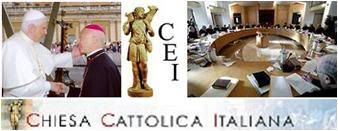 Pope addresses annual assembly
Pope addresses annual assembly
of Italian bishops and discusses
pastoral approach to current crises

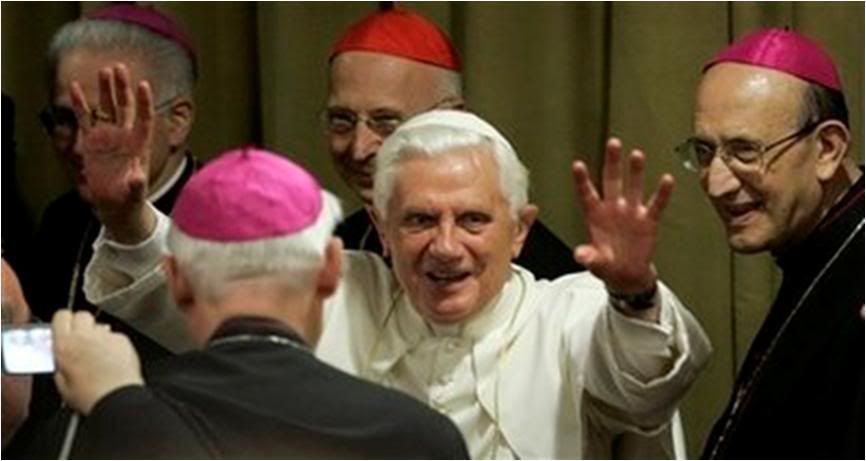
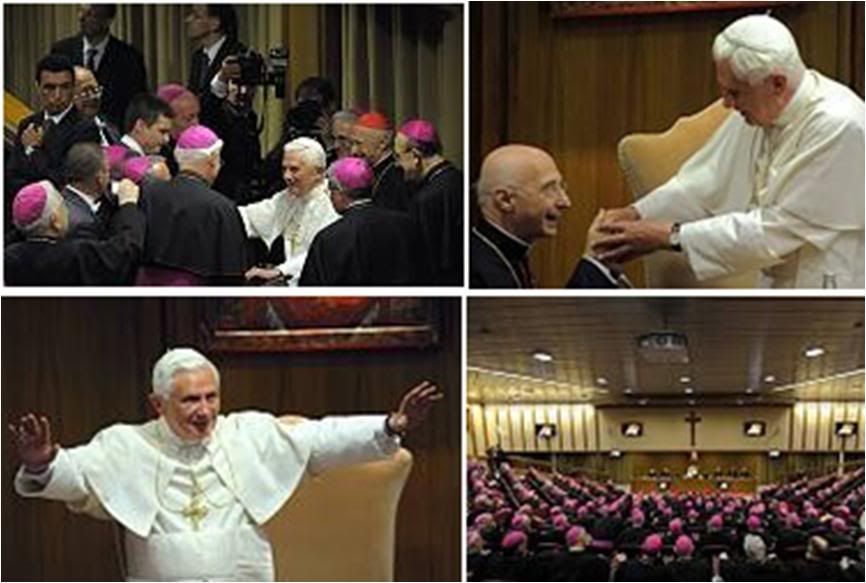
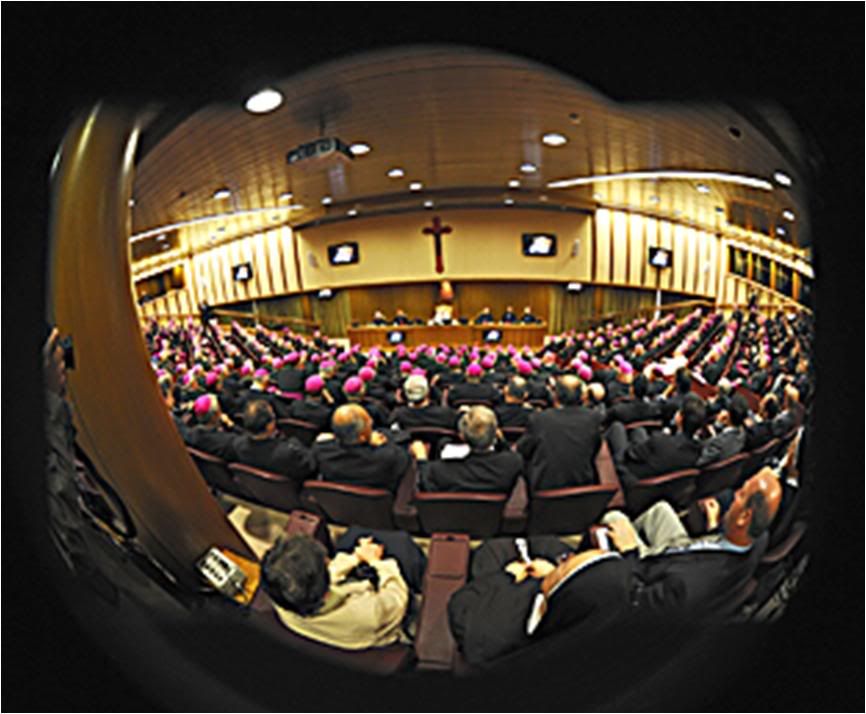
VATICAN CITY, 28 MAY 2009 (VIS) - At midday today in the Vatican, the Holy Father met participants in the general assembly of the Italian Episcopal Conference (CEI), which is meeting from 25 to 29 May to examine the theme: "The educational question: the urgent task of education".
The Pope noted how over these days the bishops are reflecting and discussing how to establish "an educational project that stems from a coherent and complete vision of man, which can arise only from the perfect image and realisation of him we have in Jesus Christ".
"At a time in which relativistic and nihilistic concepts of life exercise a powerful enticement, a time in which the very legitimacy of education is placed in doubt, the principal contribution we can make is that of bearing witness to our trust in life and in man, in his reason and in his capacity to love", said the Holy Father.
"The difficulty in forming authentic Christians interweaves and melds with the difficulty of creating responsible and mature men and women", the Pope explained.
He also emphasised the importance that "an awareness of truth and goodness, and free adherence to these values, should be at the core of the educational project, so as to give form to a process of overall development".
" For this reason", he went on, "alongside an appropriate curriculum that identifies the aim of education in the light of the model to be followed, there is a need for authoritative educators to whom new generations can look with trust".
"A true educator places himself in the front line and knows how to unite authority and exemplarity in the task of educating those entrusted to his care. We ourselves are aware of this, having been given the role of guides among the People of God, guides whom the Apostle Peter invites to tend God's sheep and to 'be examples to the flock'".
The Pope then referred to the forthcoming Year for Priests, recalling how priestly ministry "is a service to the Church and to Christian people, requiring a profound spirituality ... nourished by prayer and by intense personal union with the Lord, in order to be able to serve our brothers and sisters through preaching, the Sacraments, orderly community life and help for the poor. All priestly ministry reveals ... the importance of commitment to education, so that people may grow freely and responsibly as mature and conscientious Christians.
"There can be no doubt that the Christian spirit gives renewed vitality to that sense of solidarity so profoundly rooted in the hearts of the Italian people", Benedict XVI added, going on to mention the recent earthquake in the Abruzzo region of Italy and his own visit to the areas affected.
There, he said, "I personally witnessed the mourning, the pain and the disasters produced by that terrible event, but also the strength of spirit of those people and the movement of solidarity that immediately arose throughout Italy". In this context, the Pope also praised the initiatives promoted by the CEI through Caritas.
He then turned to consider the economic crisis which "has hit the global community so hard. ... Despite the measures taken at various levels, the social effects of the crisis are still being felt, and seriously felt, especially by the weakest strata of society and by families".
Benedict XVI also mentioned the fact that the collections raised at Mass next Sunday will be used for the "Loan of Hope" initiative, a CEI aid programme for families affected by the crisis which he described as "an eloquent testimony of the mutual sharing of burdens, .... a moving announcement of the interior conversion generated by the Gospel and a touching expression of ecclesial communion".
Finally, the Holy Father considered a particular form of ecclesiastical charity in Italy, "intellectual" charity, of which "one significant example is the commitment to promote a widespread mentality in support of life in its every aspect and moment, with particular concern for lives marked by conditions of fragility and precariousness".
Such commitment, he said is well expressed in the manifesto 'Free to live, loving life unto the end', which sees the "Italian Catholic lay people working together to ensure the country does not lack an awareness of the complete truth about man and promotion of the authentic good of people and society".
"Thus", the Pope concluded, "our minds return to the central theme of your assembly - the urgent task of education - which must be rooted in the Word of God and requires spiritual discernment, cultural and social programmes, and gratuitous and united witness".
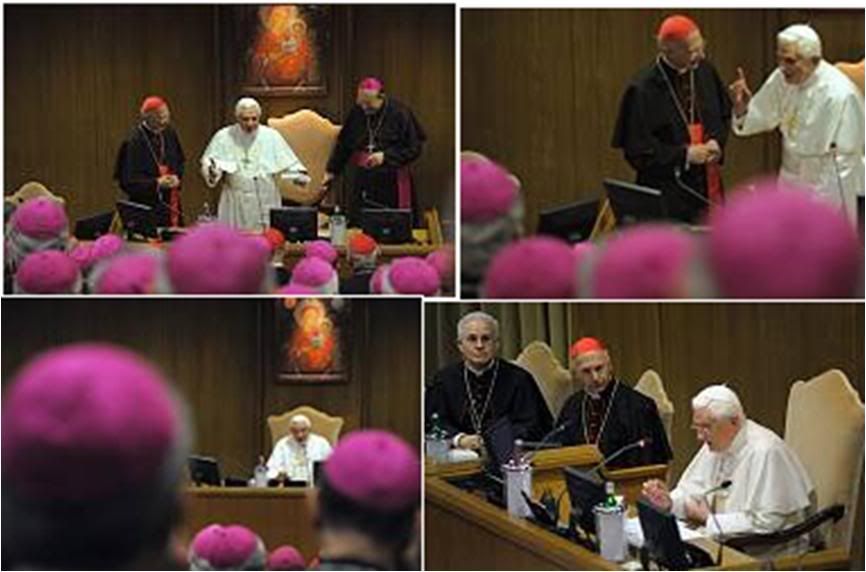 Here is a translation of the Holy Father's full address:
Here is a translation of the Holy Father's full address:
ADDRESS TO THE ANNUAL GENERAL ASSEMBLY
OF THE ITALIAN BISHOPS CONFERENCE
May 28, 2009
Dear Italian brother bishops:
I am happy to meet you once again all together, on the occasion of this significant annual appointment which sees you reunited in assembly to share the concerns and the joys of your ministry in the dioceses of this beloved Italian nation.
Your assembly, indeed, visibly expresses and promotes that communion from which the Church lives, and which is realized in your agreement over pastoral initiatives and activities.
With my presence, I come to confirm that ecclesial communion which I have constantly seen growing and becoming more firm. In particular, I thank the Cardinal President who, in the name of everyone, confirmed your fraternal adherence and cordial communion with the magisterium adn pastoral service of the Successor of Peter, thus reaffirming the singular union which links the Church in Italy to the Apostolic See.
I have received these past months so many moving testimonials of this adherence. I can only say with all my heart: Thank you!.
In this atmosphere of communion, the Christian people who feel profoundly attached to this land can profitably nourish themselves from the Word of God and from the grace of the sacraments, in order to experience a living sense of the faith and sincere belonging to the ecclesial community: all this, thanks to your pastoral leadership, to the generous service of so many priests and deacons, of religious men and women, and the lay faithful who, with assiduous dedication, sustain the ecclesial fabric and the daily life of the numerous parishes spread out to every corner of the land.
We do not hide the difficulties that they encounter in leading their members to full adherence to the Christian faith in our time. Not by chance, in many places, they have asked for a renewal of faith under the emblem of growing collaboration with the laity and their missionary co-responsibility.
For these reasons, you have wanted to deepen in your pastoral activities the missionary commitment which has characterized the course of the Church in Italy after Vatican-II, and have chosen as the focus of your reflection in this assembly the fundamental task of education.
As I have had occasion to reaffirm several times, it is a permanent and constitutive demand in the life of the Church which today tends to assume the character of urgency and even of emergency.
You have had a chance these days to listen, reflect and discuss over the need to take the reins of some sort of educative program born from a consistent and complete vision of man such as can only come from the perfect image and realization that we have in Jesus Christ.
He is the master at whose school we must rediscover the educative task as a very high vocation to which every believer, in different ways, is called.
At a time when the fascination of relativistic and nihilistic concepts of life is quite strong, and the legitimacy of education itself is called into question, the first contribution we can offer is to bear witness to our confidence in life and in man, in his reason and his capacity to love.
This is not the outcome of ingenuous optimism, but it comes to us from that 'reliable hope' (Spe salvi, 1) given to us through our faith in the redemption effected by Jesus Christ. From this established act of love for man can emerge an educative alliance among all who have responsibility in this delicate field of social and ecclesial life.
The conclusion on Sunday of the three-year Agora of Italian youth, which saw your Conference engaged in well-articulated activities to animate the pastoral ministry for young people, represents an invitation to verify the educative path in progress, and to undertake new projects for a set of beneficiaries - the new generations - extremely ample and significant projects on the educative responsibility of our ecclesial communities and all of society.
The work of formation, finally, should broaden into adulthood, which is not exempt from a true and proper responsibility for continuing education. No one is exempted from the task of taking care of one's own growth and that of others, towards the 'measure of fullness in Christ' (Eph 4,13).
The difficulty of forming authentic Christians is so woven in as to fuse with the difficulty of raising responsible and mature men and women, in whom awareness of truth and goodness, and free adherence to these concepts, are at the center of the educative project, which would be capable of giving form to a path of global growth that is apporpriately predisposed and followed through.
Therefore, along with an adequate plan that sets the goal of education according to a desired model, there is a need for authoritative educators to whom the new generations can look to with confidence.
In this Pauline Year - which we have lived in a deeper study of the words and example of the great Apostle of the Gentiles, and which you have celebrated in various ways in your dioceses, and yesterday, all together at the Basilica of St. Paul outside the Walls - his invitation resounds with singular effect: "Be imitators of me as I am of Christ!" (1 Cor 11,1). Courageous words.
But a true educator puts himself into play first of all, and knows how to unite authority with exemplariness in the task of educating those who are entrusted to him. We are aware of that ourselves, placed as we are as guides among the people of God, we to whom the Apostle Peter addressed, in his turn, the invitation to pasture the flock of God, making ourselves 'examples to the flock' (1 Pt 5,3). Even this is a statement to meditate upon.
That is why the circumstance is singularly happy that we are about to celebrate, after the year dedicated to the Apostle of the Gentiles, a Year of the Priest. We are called, along with our priests, to rediscover the grace and the mission of the priestly ministry.
This ministry is a service to the Church and to the Christian people, and requires profound spirituality. In response to the divine calling, this spirituality must nourish itself on prayer and an intense personal union with the Lord in order to be able to serve our brothers through preaching, the sacraments, an orderly community life and help to the poor.
Thus the entire priestly ministry itself highlights the importance of the educative commitment, so that persons in our care may grow to be free, truly free, and therefore, responsible Christians who are mature and aware.
There is no doubt that the sense of solidarity that is profoundly rooted in the hearts of Italians draws ever renewed vitality from the Christian spirit, a solidarity that expresses itself with particular intensity during dramatic circumstances in the life of the nation, the last of which was the devastating earthquake which struck some areas of the Abruzzo region.
As your president has said, I had the opportunity, in my visit to that tragically wounded land, to note firsthand the mourning, the sorrow and the disasters produced by the terrible earthquake, but also - and this, to me, was truly most impressive - the strength of spirit among that population, along with the movement of solidarity which promptly got underway in all parts of Italy.
Our communities responded with great generosity to the requests for assistance which came from the region, sustaining the initiatives promoted by the Italian bishops conference through Caritas. I wish to renew to the bishops of Abruzzo, and through them, to the local communities, the assurance of my constant prayers and my enduring and affectionate closeness.
For months we have been noting the effects of a financial and economic crisis which has severely registered on the global scenario and has reached all countries in varying degrees. Despite the measures that have been taken at various levels, the social effects of the crisis have not failed to make themselves felt, even very harshly, and particularly on the weakest sectors of society and on families.
Thus I wish to express my appreciation and encouragement for the initiative of a solidarity fund called 'Loan of Hope' which will have nationwide participation in the collections next Sunday to start off the fund.
This renewed call on the people's generosity, added to the other initiatives previously taken by various dioceses - evoking the collection promoted by the Apostle Paul for the Church in Jerusalem -is eloquent testimony of sharing the weight endured by others.
In a time of difficulty, which today particularly hits those who have lost their jobs, this becomes a true act of worship which is born from the charity inspired by the Spirit of the Risen Lord in the heart of believers. It is an eloquent proclamation of the interior conversion generated by the Gospel and a touching manifestation of ecclesial communion.
An essential form of charity in which the Churches of Italy are actively engaged is intellectual charity. A significant example is the commitment to promote a widespread mentality in favor of life in its every aspect and at every moment, with particular attention to those aspects marked by conditions of great fragility and precariousness.
This commitment is evidenced by the manifesto "Free to live: Love life to the very end", which sees the Italian Catholic laity united in working so that consciousness of the full truth about man and the promotion of the authentic good of persons and society may never lack in this country.
The Yeses and heh Nos expressed therein sketch the outlines of true educative activity and express true and concrete love for every human being. Thus the mind turns to the central theme of your assembly - the urgent task of education - which demands rootedness in the Word of God, along with spiritual discernment, cultural and social projection, and bearing witness to unity and gratuity.
Dearest brothers, a few days separate us from Pentecost, on which we celebrate the gift of the Spirit who takes down frontiers and opens us to understanding truth in its entirety.
Let us invoke the Comforter who does not abandon those who turn to him, entrusting to him the path of the Church in Italy and every person who lives in this beloved country. May the Spirit of life come down on all of us and light our hearts with the fire of his infinite love.
From the heart, I bless you and your communities.
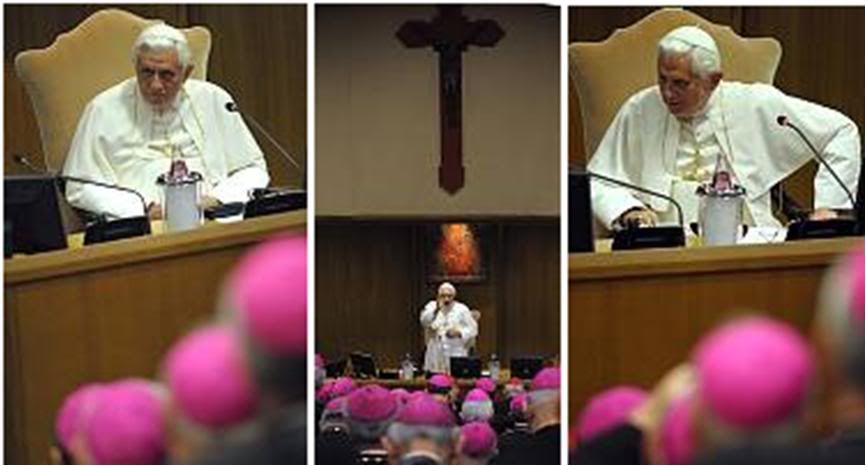
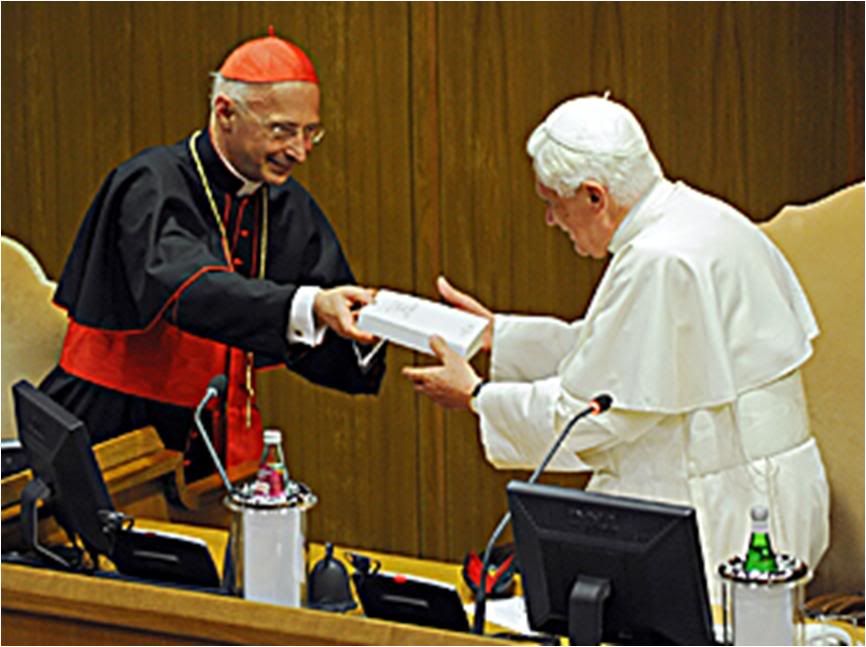
[Modificato da TERESA BENEDETTA 29/05/2009 02:09]